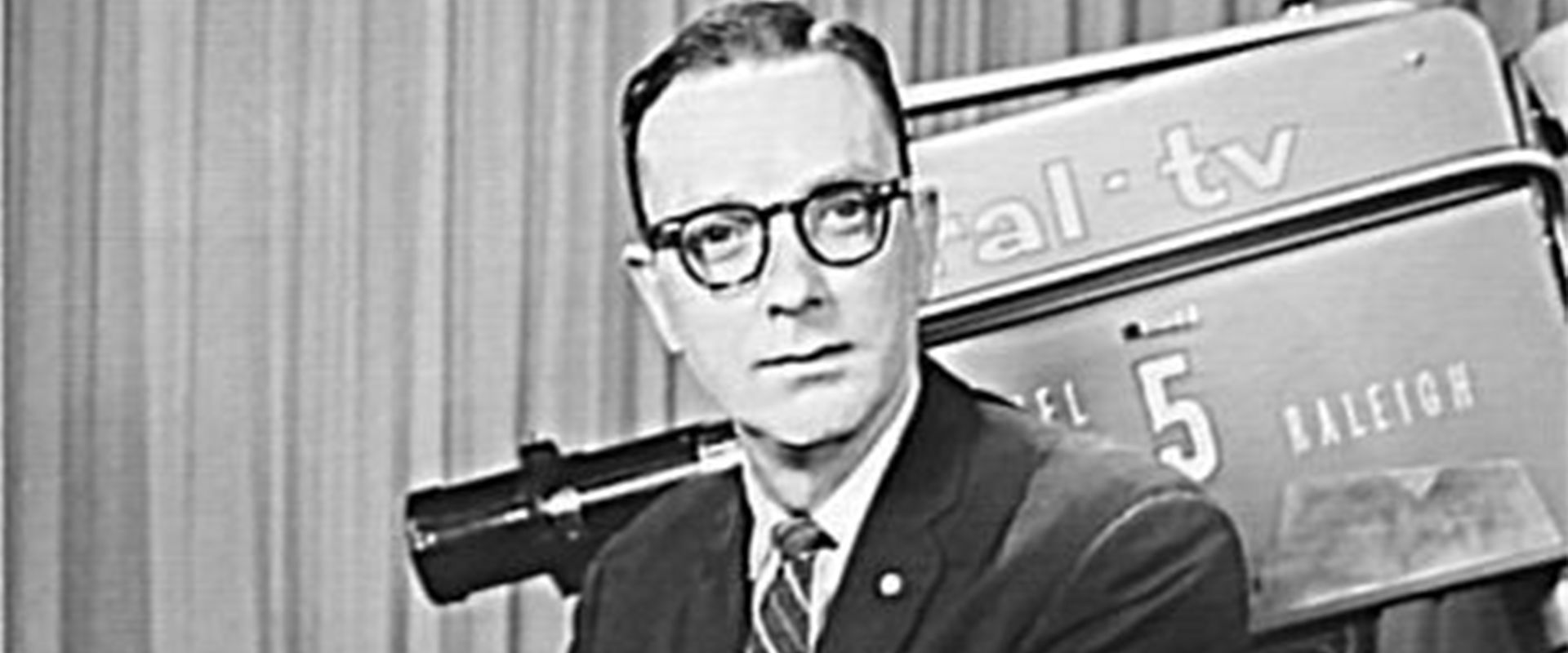Jesse A. Helms Biography
early life
Jesse Alexander Helms Jr. was born on October 18, 1921, in Monroe, NC to Jesse Alexander Sr. and Ethel Mae. A seventh generation Helms family member to grow up in Monroe, Jesse, Jr. was part of a close-knit family that included an older brother, Wriston, and a younger sister, Mary Elizabeth. At the age of nine, young Jesse’s first job was sweeping the floors of the Monroe Enquirer, the local newspaper. This introduction to the newspaper world proved to be a watershed moment in Helms’ early life, and in 1939, at the age of 18, Helms began writing sports articles for the Monroe Enquirer, the Journal and The Charlotte News.
Helms attended Wingate University for one year before transferring to Wake Forest College in hopes of advancing his education in journalism. Once enrolled at Wake Forest, Helms took a job on campus writing sports publicity and washing dishes at the boarding house where he stayed. A chance meeting with the managing editor of The Raleigh News & Observer quickly led to an overnight proofreading job with the paper. Holding four jobs and attending college was no easy endeavor, but Helms remained undaunted. Through a series of events and great perseverance, Helms went from an overnight proofreader to a full-time sports writer with The News & Observer and eventually withdrew from his university studies to pursue a full-time newspaper career. In his 2005 memoir, Helms explained, “My own purpose back then wasn’t to get a diploma, it was to get the foundation needed for the jobs I wanted to have.”
Family and career
While with The News & Observer, Helms met a woman who changed his life. Dorothy Coble, a recent graduate of the University of North Carolina at Chapel Hill, was the editor for The News & Observer’s society pages. Helms said, “The best path to my desk in the sports department was past Dot, and I made it my business to travel that path often.” The pair formed a lifelong friendship that lasted through their marriage on October 31, 1942, until Helms’ death in 2008.
In the fall of 1941, Helms moved to the Raleigh Times as a regular news reporter and assistant city director. Not long after, with the attacks at Pearl Harbor on December 7, 1941, Helms volunteered to serve in the United States Navy. For four years, Helms was a Navy recruiter, although he applied several times for active sea duty and once as an officer trainer (he was rejected because of hearing loss in his left ear). Most of his service was spent in Raleigh, with the exception of some time spent in Columbus, Georgia. Upon returning to Raleigh, shortly after the birth of his first daughter, Jane, Helms accepted a position as News Director of WCBT in Roanoke Rapids, North Carolina. The move to radio was another watershed moment in Helms’ life, and through this work, he met the owner of WRAL, A.J. Fletcher. In 1948, Helms returned to Raleigh to work for Fletcher as the news director for WRAL and two other statewide radio networks operated by the Capitol Broadcasting Company. Throughout his life, Helms referred to Fletcher as a father figure and credited him as one of the people who challenged him to flesh out his political beliefs.
politics
The 1950 Senate race was Helms’ first brush with national politics. Fletcher’s former law partner, Willis Smith, ran for the Democratic seat against one-term Senator, and former UNC- Chapel Hill President Franklin Porter Graham. Helms, although not officially a part of the Smith campaign, gave Smith his strong support in this high profile race. When Smith won the election, he asked Helms to accompany him to Washington, D.C. as his administrative assistant. Following Smith’s death in 1953, Helms returned to Raleigh as the Executive Director for the North Carolina Bankers Association (NCBA). During that time Helms was also elected to the Raleigh City Council.
Helms never completely stepped away from broadcasting. During his time with the NCBA, Helms hosted a short Sunday program called Facts of the Matter. In November 1960 Helms left the NCBA and took a job as executive vice president for News Operations at WRAL-TV and Capitol Broadcasting Company. Between 1960 and 1972 Helms delivered over 2700 Viewpoints on a daily editorial program, becoming a household name and putting WRAL-TV in the national spotlight.
By the early 1970s, Helms was encouraged by many supporters to run for the United States Senate. Though reluctant at first, Helms agreed, and after a long campaign against Congressman Nick Galifianakis, Helms surprised himself by winning the election. Helms remembered hearing Walter Cronkite say, “Down in North Carolina, a fellow named Jesse Helms has been elected to the United States Senate.” Helms was sworn into office in January 1973 and quickly rose to an influential position in the Senate, where he is credited as being one of the key leaders in the rise of the modern conservative movement. Senator Helms played an integral role in Reagan’s 1976 primary campaign and strongly endorsed his candidacy. Without a victory in North Carolina Governor Reagan would have been forced to drop from the race and, perhaps, there would never have been a President Reagan. In his book Reagan’s Revolution, author Craig Shirley writes, “Had Reagan lost in North Carolina, despite his public pronouncements…he would have made a gracious exit speech…and Reagan would have faded into political oblivion.”
By 1978, The Raleigh News & Observer dubbed him “Senator No” for his strong convictions to uphold his conservative principles, a moniker he considered a compliment throughout his career. Helms was a master of the Senate rules and procedures, routinely reading everything he could on issues brought up for a vote. He felt it was his duty and obligation to fully understand the facts and implications of all legislation affecting his constituents.
The Senator was instrumental in establishing the bipartisan Senate Steering Committee, a committee designed to formally organize conservative public policy positions. The issues on which Helms focused during his career were varied but were always deeply rooted in his conservative principles and to what he felt was his moral responsibility. Helms also took a great interest in foreign affairs, rising to the role of chairman of the Senate Foreign Relations Committee in 1995. Later, after working closely with Senator Joe Biden to reform the United Nations, Helms became the first legislator in history to speak before the United Nations Security Council.
In 2001, Helms announced he would not run for a sixth term and, in 2003, retired to Raleigh with his wife, three children, and seven grandchildren. Helms lived happily in retirement with his family until his death on July 4, 2008.









